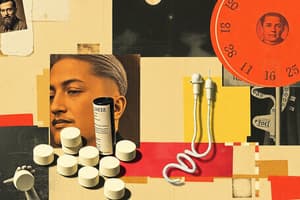Podcast
Questions and Answers
What are some examples of antimuscarinic drugs, and what are their common therapeutic indications?
What are some examples of antimuscarinic drugs, and what are their common therapeutic indications?
Examples of antimuscarinic drugs include atropine and scopolamine, which are commonly indicated for motion sickness, muscarinic poisoning, and to reduce secretions during surgery.
Describe the central nervous system (CNS) effects and potential toxicity associated with antimuscarinic drugs.
Describe the central nervous system (CNS) effects and potential toxicity associated with antimuscarinic drugs.
CNS effects can include confusion, memory disturbances, and hallucinations, while toxicity symptoms may involve dry mouth, blurred vision, and urinary retention.
How do antimuscarinic drugs affect secretions in the body?
How do antimuscarinic drugs affect secretions in the body?
Antimuscarinic drugs generally reduce secretions, leading to dry mouth, decreased sweating, and less bronchial mucus production.
Explain the mechanism of action of atropine in relation to its effects on the cardiovascular system.
Explain the mechanism of action of atropine in relation to its effects on the cardiovascular system.
What is the effect of excessive antimuscarinic drug use, and how might it present clinically?
What is the effect of excessive antimuscarinic drug use, and how might it present clinically?
What are two common examples of anticholinergic agents and their uses?
What are two common examples of anticholinergic agents and their uses?
Explain the primary therapeutic indication for botulinum toxin and its mechanism of action.
Explain the primary therapeutic indication for botulinum toxin and its mechanism of action.
What are some central nervous system effects of anticholinergic drugs?
What are some central nervous system effects of anticholinergic drugs?
How do anticholinergic drugs affect secretions in the body?
How do anticholinergic drugs affect secretions in the body?
Describe the mechanism of action of pralidoxime and when it is indicated.
Describe the mechanism of action of pralidoxime and when it is indicated.
Flashcards are hidden until you start studying
Study Notes
Antimuscarinic Drugs
- Examples include atropine, scopolamine, ipratropium, tiotropium, glycopyrrolate, and oxybutynin.
- Therapeutic indications include:
- Asthma and COPD: Ipratropium and tiotropium help relax airway smooth muscles, improving airflow.
- Overactive bladder (OAB): Oxybutynin helps reduce bladder spasms and urinary frequency.
- Motion sickness: Scopolamine is effective for preventing nausea and vomiting.
- Premedication for surgery: Atropine helps reduce salivary and bronchial secretions.
- Bradycardia: Atropine increases heart rate by blocking the effects of acetylcholine on the heart.
CNS Effects and Toxicity
- Antimuscarinic drugs can cross the blood-brain barrier, leading to central nervous system (CNS) effects:
- Drowsiness
- Confusion
- Hallucinations
- Delirium
- Memory impairment
- Toxicity:
- Anticholinergic syndrome: This occurs with excessive antimuscarinic drug use and is characterized by:
- Dry mouth
- Blurred vision
- Constipation
- Urinary retention
- Tachycardia
- Mydriasis (dilated pupils)
- Flushing
- Delirium
- Agitation
- Fever
- Seizures
- Coma
- Anticholinergic syndrome: This occurs with excessive antimuscarinic drug use and is characterized by:
Effect on Secretions
- Antimuscarinic drugs inhibit the release of acetylcholine, which is a neurotransmitter that stimulates glands to release secretions.
- This can lead to:
- Dry mouth
- Reduced nasal secretions
- Decreased bronchial secretions
- Constipation
Mechanism of Action of Atropine
- Atropine is a competitive antagonist of acetylcholine at muscarinic receptors, meaning it blocks the effects of acetylcholine by binding to the same sites as it.
- This blocks the action of acetylcholine on the heart, increasing heart rate (tachycardia).
Anticholinergic Agents and Uses
- Atropine: As mentioned above, it's used to treat bradycardia, reduce secretions during surgery, and can be used to counteract the effects of organophosphate poisoning.
- Scopolamine: Mainly used for motion sickness and to reduce secretions during surgery.
Botulinum Toxin
- Therapeutic indication: Botulinum toxin (Botox) is primarily used for muscle spasticity and dystonia, which are conditions characterized by involuntary muscle contractions.
- Mechanism of action: Botulinum toxin blocks the release of acetylcholine at the neuromuscular junction, causing temporary paralysis of the affected muscles.
Central Nervous System Effects of Anticholinergic Drugs
- As mentioned above, anticholinergic drugs can cross the blood-brain barrier.
- Common CNS effects:
- Confusion
- Drowsiness
- Hallucinations
- Delirium
- Memory impairment
Anticholinergics and Secretions
- As explained above, anticholinergic drugs inhibit the release of acetylcholine, which regulates secretions.
- This leads to reduced secretions across various glands, including:
- Salivary glands
- Nasal glands
- Bronchial glands
- Sweat glands
- Digestive glands
Pralidoxime
- Mechanism of action: Pralidoxime is a cholinesterase reactivator. It removes organophosphates from the active site of acetylcholinesterase, restoring the enzyme's activity and allowing acetylcholine to break down normally.
- Indications: Pralidoxime is indicated for the treatment of organophosphate poisoning, which can occur from exposure to pesticides or nerve agents. It is most effective when administered early in the poisoning process.
Studying That Suits You
Use AI to generate personalized quizzes and flashcards to suit your learning preferences.




